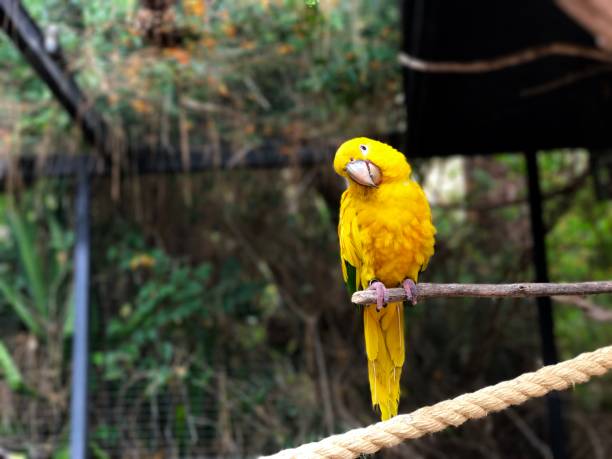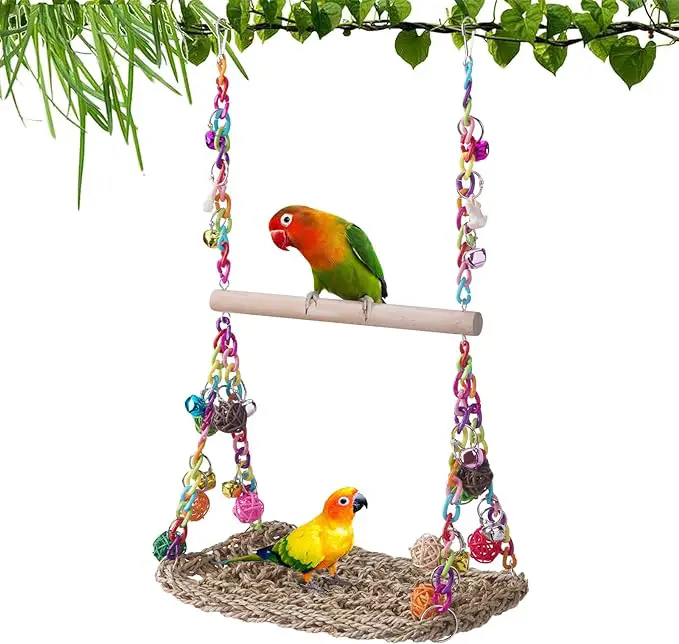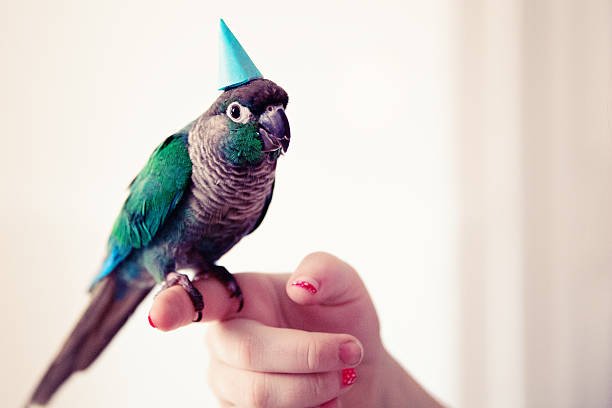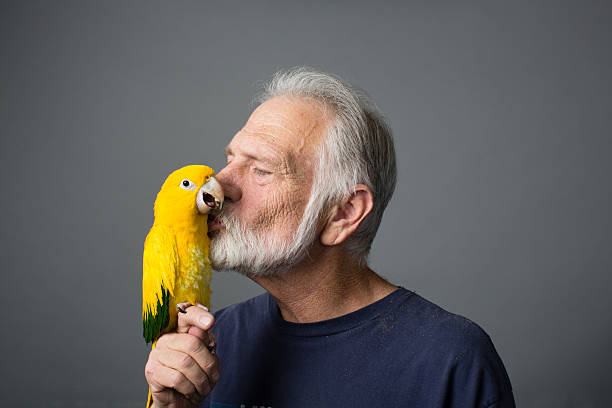Helpful Guides on each Category

Conures are smart small to medium-sized parrots with curved beaks, long tails of about 15 inches, and colourful feathers that come in blue, red, green, orange, or yellow similar to a macaw. They are known for their playful personalities and intelligence.
Want to keep a conure? Quick heads-up…
- With more than 90 different species and subspecies of conures, they are one of the more varied groups of parrots.
- Conures are social birds and do well in pairs or small flocks.
- Conure birds are intelligent and can be trained to talk, sing, and perform tricks.
- They require a lot of attention and interaction from their owners.
Quick Overview
| COLOUR: | Blue, Yellow, Green, Red, Orange. |
| SIZE: | Small, Medium. |
| LIFESPAN: | 15 – 20 yrs. |
| INTERACTION: | Very Social Bird. |
| FOOD: | Seeds, Fruits, Nuts, Berries, Flowers, Vegetables. |
| DISEASES: | Psittacine Beak and Feather Disease (PBFD), Proventricular Dilatation Disease (PDD), Chlamydiosis, Aspergillosis, Beak malocclusion. |

Nativity/Natural Habitat of Conure Birds
Conures are native to Central and South America. Their natural habitat where they live as flocks depends on the species, but they are mostly found in forests, woodlands, savannas, and even spiny shrublands.
They live in flocks of 10 to 20 individuals and spend their days foraging for food, preening, and socialising.
The Most Popular Species of conures that are found in homes as pets include;
- Sun Conure bird (Aratinga solstitialis)
- Jenday Conure bird (Aratinga jendaya)
- Green-cheeked conure bird (Pyrrhura molinae)
- Blue-crowned Conure bird (Thectocercus acuticaudatus)
- Nanday Conure bird (Aratinga nenday)
- Maroon-bellied conure bird (Pyrrhura rupicola)
- Scarlet-Fronted Conure bird (Pyrrhura roseifrons)
- Pineapple Conure bird (Aratinga leucophthalmus)
- White-Eyed Conure bird (Pyrrhura leucotis)
- Turquoise-Fronted Conure bird (Eupsittula pertinax)
- Blaze-winged conure bird (Pyrrhura devillii)
Lifespan: How long will a conure live?

It depends on the kind of conure and how well you take care of it. Some species of conures naturally live longer than others. The average lifespan of this bird is around 20 years with good care. But with regular health checks, it will easily live up to 30 years.
Keeping Conure birds as pets
Conures make wonderful pets, but they are a significant commitment. Here’s a breakdown to help you decide:
Advantages
- Playful and affectionate
- Intelligent and can learn tricks
- Relatively long lifespan (up to 30 years)
Disadvantages
- Require a lot of attention (several hours outside the cage daily)
- Can be loud (screaming and screeching)
- Need a spacious cage and plenty of enrichment
- Can be nippy, especially during hormonal changes
Should I cover my conure cage at night?
yes, I do that with my birds as it makes them feel secure and simulates a natural sunset/sunrise. Also, Darkness encourages them to rest peacefully.
How do you touch a conure?
Always approach touching your conure with caution and respect:
- Spend time socializing and interacting with them outside the cage.
- Look for a relaxed posture, puffed feathers show they’re uncomfortable.
- Let them climb onto your finger instead of grabbing them.
- Gentle head scratches or beak strokes are good starting points.
How do I know if my conure is happy?
A happy conure is a chatty conure! If your conure bird is singing and chirping up a storm, that’s a good sign they’re feeling content. They might even be whistling or talking if you’ve taught them some tricks.
And just like us, happy conures love to play with their toys. If they’re shredding, climbing, and swinging with glee, that means they’re having a good time.
Regular preening shows they feel comfortable and relaxed. Bobbing their head is a sign of contentment and enjoyment.
Talking: Can a conure bird talk?

Yes, conures can talk! While not as renowned for speech as African Greys or Amazons, conures can learn to mimic words and phrases. Their vocabulary might be smaller, but they are still quite the chatterboxes.
There’s no set starting age for conures to talk. Some mimic sounds as early as 8 months old, while others might take a year or two. It depends on the individual bird and how much exposure they have to speech.
Feeding: What do conure birds eat?
For pet conures, here’s the scoop on what conure birds eat:
- Seeds
- Fruits
- Nuts
- Berries
- Flowers
- Vegetation
- Sometimes even insects and larvae
- High-quality commercial parrot pellets
- Eggs
My friend who is a vet told me he has gotten so many questions on whether to feed a conure treat like rice or chicken. I asked him the same question though;
- Rice: Not ideal as a main food source. It lacks essential nutrients. Offered occasionally in small quantities is okay.
- Chicken: Not a regular part of their diet. Small, cooked, shredded pieces can be offered as a rare treat.
Behaviour and Personality
Can I kiss my conure?
It’s best to avoid kissing your conure. Our mouths harbour bacteria that can be harmful to birds. Instead, how affection with gentle scratches, head nuzzles (if your conure offers them), or talking softly.
Do conures get jealous?
Yes, conures can exhibit jealous behaviour. They are intelligent and social creatures who form strong bonds with their caregivers. If they feel you’re giving attention to someone or something else, they might act out with nipping, loud noises, or withdrawn behaviour.
Can conures bite?
Yes, conures can bite. This is a natural behaviour for parrots used for communication, exploration, or defence.
What are conures scared of?
Many things can scare a conure, including sudden movements, loud noises, unfamiliar objects, and new people.
Do conures recognize faces?
Yes, conures can recognize faces and distinguish between familiar and unfamiliar people. They bond with their caregivers and can become quite attached.
Do conures sleep at night?
Yes, conures sleep at night, just like us! They typically need 10-12 hours of sleep. They will roost in a quiet, dark place in their cage at night.
Mating and Breeding
Do conures lay eggs without mating?
Yes, conures can lay infertile eggs even without mating. This is called egg-binding. However, it’s less common than with mated females.
What age do conures lay eggs?
Sexual maturity varies depending on the conure species, but it generally falls between 18 months to 3 years old.
How many times do conures lay eggs?
Conure moms lay a few eggs (2-5) over time until they have a full nest. Taking away the eggs makes them want to lay more to fill it back up, so leave them in to avoid health problems. Unmated females might lay a single egg occasionally.
What to do if conure lays eggs?
If your conure lays an egg and you don’t want it to lay more, remove the single egg immediately from the cage. Having an egg in the cage can stimulate further egg-laying to make up a clutch.
- Limit daylight hours to 10-12 hours of light and 12-14 hours of darkness.
- Avoid providing shredded paper, cosy spots, or anything that resembles a nesting area in the cage.
Common Health Conditions
Psittacine Beak and Feather Disease (PBFD)
One condition we see sometimes is called Psittacine Beak and Feather Disease (PBFD). It’s a virus that can affect feathers and beaks, making them look abnormal. While there’s no cure, early detection helps manage it and keep your feathered friend comfortable.
Proventricular Dilatation Disease (PDD)
This is another condition that strikes conure birds. It affects the digestive system, causing weight loss, vomiting, and loose droppings.
Chlamydiosis
This is a bacterial disease that can be transmitted from birds to humans. Symptoms of chlamydiosis in birds can include lethargy, weight loss, and respiratory problems
Aspergillosis
Aspergillosis is a fungal infection that can affect the lungs. If your conure seems to be having trouble breathing, coughing a lot, or losing weight, this could be a culprit. We have treatments to fight this fungal foe.
Beak malocclusion
Sometimes, a conure’s beak can grow unevenly, making it hard for them to eat and preen. This is called beak malocclusion. Regular checkups help us spot this early and keep their beak in tip-top shape.
Zinc toxicity
Conures are curious and might nibble on things they shouldn’t. Be careful of zinc, which is found in some household items. Too much zinc can be toxic, causing vomiting, diarrhoea, and even seizures.


